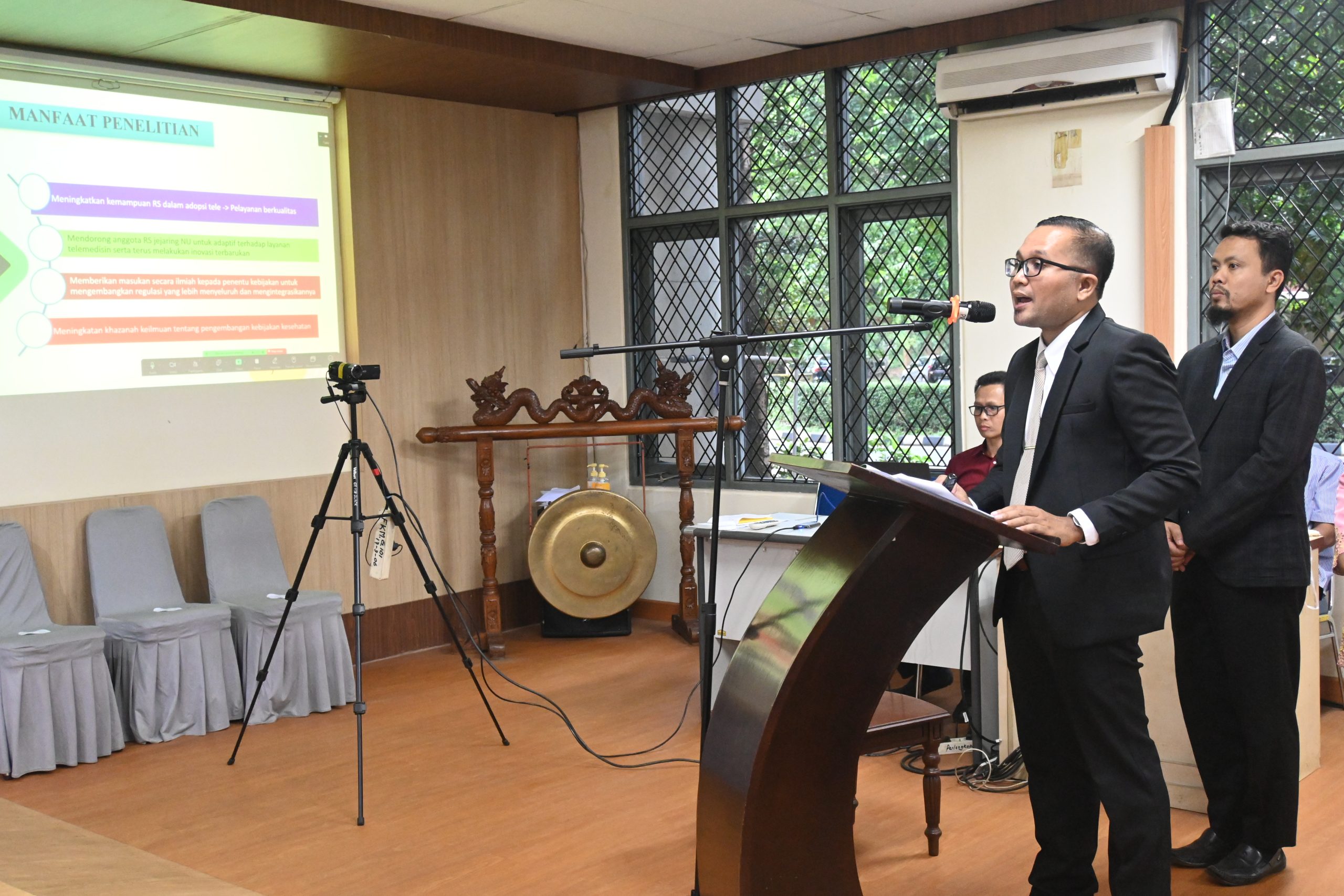The Faculty of Public Health (FPH) at the Universitas Indonesia (UI) once again held an open doctoral promotion session on Monday, July 8, 2024. On this occasion, the promovendus Fery Rahman successfully defended his dissertation titled “Analysis of the Telemedicine Model in the Nahdlatul Ulama Network Hospitals in Indonesia”. The session, chaired by Prof. dr. Anhari Achadi, S.K.M., Sc.D., was held at the Doctoral Promotion Room, Building G, FPH UI. The session was also attended by Prof. dr. Amal Chalik Sjaaf, S.K.M., Dr.PH., as the Promotor, and Prof. dr. Purnawan Junadi, M.P.H., Ph.D., and Prof. Dr. dr. Budi Wiweko, Sp.OG., M.P.H., as the Co-Promotors.
The promovendus’s innovative research focuses on the analysis of the telemedicine service model at Nahdlatul Ulama Network Hospitals, taking into account the current global development which has entered the 4.0 industrial revolution era—a phenomenon where there is a collaboration between cyber technology and automation technology. Based on internet quality assessment data for community health centers (Puskesmas) across Indonesia released by the Indonesian Ministry of Health, there are: 7.2% with no internet access, 14.2% with inadequate internet, 53.7% with sufficient internet, and 25% with high-quality internet.
Telemedicine allows patients to consult with doctors anywhere and anytime, without barriers related to facilities or geographical location. However, the adoption of telemedicine in Indonesia faces various challenges that hinder its widespread implementation, one of which is the difficulty in integrating technological advancements in the medical sector into the health service system. The Strategy Purchasing for Primary Health Care (SPPHC) data also shows that only 28% of healthcare facilities utilize telemedicine through apps like Komen, while 72% use messaging or meeting apps such as WhatsApp, Zoom Meeting, and Google Meet, which are not intended for telemedicine services.
The promovendus’s dissertation research concludes that the telemedicine service model at the NU network hospitals is teleradiology and teleconsultation, with platforms such as WhatsApp/hotline for the hospital, personal mobile phones, and additional apps like Zoom Meeting. Several influencing factors were identified, including the development of Standard Operating Procedures (SOPs) by hospital management, adequate internet infrastructure (>200 Mbps), the presence of an integrated Electronic Medical Record (EMR) with telemedicine, and health workers’ literacy and competency in telemedicine services. Additionally, for the designation of units responsible for guidance and supervision, there should be uniformity, and medication delivery should be facilitated through telepharmacy, which allows patients to avoid waiting in line for their medication.
Given that telemedicine is a new concept in the healthcare service system, it requires special attention to its enhancement. Through his dissertation, the promovendus recommends that the government should establish national guidelines, procedures, and regulations for telemedicine services as a foundation for hospitals to develop their SOPs for telemedicine. He also urges the government to accelerate the realization of the Indonesia Health Services (IHS) as a standardized and comprehensive data aggregator platform, which should include a roadmap for telemedicine service development. The Nahdlatul Ulama Hospital Association (ARSINU) could also play a role in developing telemedicine as an enabling project within the NU network hospitals; developing a specialized app for all ARSINU members and the public; and actively disseminating updated regulations related to telemedicine. The promovendus also suggested that academics continue to develop studies or research on telemedicine services to ensure that this service evolves and is widely accessible to the public for healthcare access.
Following the discussion with the session chair, promoter, co-promoters, and the examining committee consisting of Dr. drs. Sutanto Priyo Hastono, M.Kes.; Dr. dr. Trihono, M.Sc.; Dr. dr. HM. Zulfikar As’ad, MMR.; and Ir. Ahmad Syafiq, M.Sc., Ph.D., Fery Rahman was declared successful in earning his Doctoral degree in Public Health and was recorded as the 36th doctoral graduate of the Public Health Science program in 2024, the 332nd doctoral graduate of the Public Health Science program, and the 425th doctoral graduate of FPH UI. Fery, an intellectual born in Pamekasan and a doctor as well as the Secretary-General of ARSINU, received full support from his family in completing his doctoral studies at the Faculty of Public Health, University of Indonesia. (DFD)

